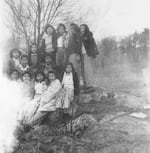The U.S. government’s Indian boarding school system is the focus of legislation that’s been reintroduced in the U.S. Senate.
For over a century after colonization, thousands of Native American children were taken from their families and put into government or church-run boarding schools as part of a broader effort to assimilate them to adopt Western customs. While some were taken to nearby schools in their area, others found themselves hundreds of miles away from home.
Cultural practices — from long hair to wearing traditional dress — were prohibited. The concept for many school staff was to “civilize” Native American children and condition them to behave and learn as non-Indians were for the era.

In this photo taken Jan. 2023, U.S. Interior Secretary Deb Haaland (center) looks at archival photos of the Phoenix Boarding School during a visit to Arizona as part of her "Road to Healing" tour.
Courtesy of U.S. Department of the Interior
While the boarding school system has since largely shut down, controversy has remained. Over 50 mass graves have been discovered near many boarding schools in the U.S., reflecting the hardship, illness and neglect many Native children suffered. It’s surmised that at least 500 children died while in boarding schools, with some researchers fearing that number will escalate over time as more investigations are carried out.
Melvin Sheldon is a Tulalip Indian member and councilman, president of the Affiliated Tribes of Northwest Indians (ATNI) and a Pacific Northwest co-delegate for the National Congress of American Indians (NCAI). He said while many children were being systematically indoctrinated into a Western way of life, many were also emotionally or physically abused.
“If you didn’t learn the (English) language, they would punish you. If you spoke your own language, you were punished,” Sheldon said. “Who knows what other areas that they would punish our young boys and girls as they endured the boarding school experience?”
Recently, Secretary of the Interior Deb Haaland came to the Tulalip reservation as part of her “Road to Healing” campaign, where survivors and others familiar with the boarding school system shared stories about their experiences. Many spoke of being made to choose their punishment, which included a willow stick, belt, or “Jesus Rope.”
There have been a few supporters of the boarding school system, often Native people who said they learned skills and trades or found direction in their lives. Sheldon acknowledges it’s been a mixed legacy, but added that he’s glad there is greater acceptance and support of tribal traditions than before.
“We were able to resuscitate our language, it brought pride and identity back. We were glad for the elders who survived and shared with us what they could,” Sheldon said. “We are glad for our Seventh Generation and the positiveness they will experience.”
The bill — named the Truth and Healing Commission on Indian Boarding School Policies in the United States Act — would form a commission to investigate, document and acknowledge past injustices by the federal government in its boarding school system.

Native American students at Winnebago Indian Boarding School in Neillsville, Wisconsin in 1945.
Ishikawa Hayes Collection/Densho Digital Repository
More than two dozen senators have co-sponsored the bill, including Oregon Democrats Jeff Merkley and Ron Wyden.
“The Indian Boarding School was a shameful human rights violation perpetrated by the federal government,” Wyden said in a press release. “Attempts to terminate Native cultures, assimilation practices and other horrendous actions by the federal government have caused Indigenous communities to suffer unimaginable pain and intergenerational trauma. The federal government must acknowledge its past injustices towards Indigenous communities and develop paths towards healing.”
“Centuries of horrific injustices against Native American Tribes and their children are constantly overlooked in the teaching of our nation’s history. Justice requires acknowledgment of that history and healing for the descendants of that legacy of injustice— we must reckon with our past,” Merkley said. “Creating a commission that will examine the human rights violations that took place at Indian boarding schools is a necessary step to begin to atone for the resulting and enduring intergenerational trauma.”
Groups supporting the bill besides the NCAI and ATNI are the National Native American Boarding School Healing Coalition, National Indian Education Association, National Indian Health Board, National Council of Urban Indian Health, National Indian Child Welfare Association, American Indian Higher Education Consortium, National Indigenous Women’s Resource Center, Seattle Indian Health Board, Jesuit Conference of Canada and the United States, Friends Committee on National Legislation and United South and the Eastern Tribes Sovereignty Protection Fund.